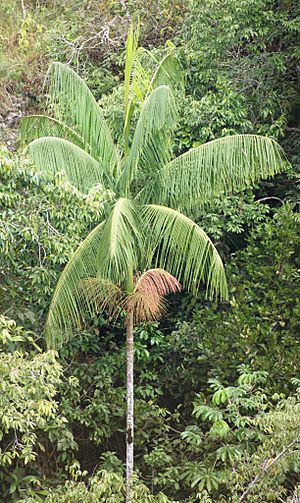Jucara facts for kids
Quick facts for kids Jucara |
|
|---|---|
 |
|
| Scientific classification |
|
| Kingdom: | Plantae |
| Clade: | Tracheophytes |
| Clade: | Angiosperms |
| Clade: | Monocots |
| Clade: | Commelinids |
| Order: | Arecales |
| Family: | Arecaceae |
| Genus: | Euterpe |
| Species: |
E. edulis
|
| Binomial name | |
| Euterpe edulis |
|
| Script error: The function "autoWithCaption" does not exist. | |
Script error: No such module "Check for conflicting parameters".
Euterpe edulis, often called juçara or jussara, is a type of palm tree. You might also hear it called açaí-do-sul or palmiteiro. This palm is mostly known for its "heart of palm," which is a tasty vegetable.
The juçara palm is a close relative of the famous açaí palm (Euterpe oleracea). However, the açaí palm is grown more for its fruit and is also known for its heart of palm. A type of butterfly, the Caligo brasiliensis, has caterpillars that like to eat the leaves of the juçara palm.
In the past, many juçara palms were cut down in Brazil to get their hearts of palm. Because of this, the tree became very rare in the wild. Now, it's not harvested for sale anymore to help protect it. This means the juçara palm is an endangered species.
Contents
What is the Juçara Palm?
The juçara palm is a tall, slender palm tree that grows in certain parts of South America. It's part of the Euterpe family, which includes several types of palms. These trees are important to their natural environment.
Where Does it Grow?
The juçara palm is native to Brazil. It grows mainly in the Atlantic Forest, which is a large forest along the coast of Brazil. This forest is home to many unique plants and animals.
What is Heart of Palm?
The "heart of palm" is a vegetable taken from the inner core of certain palm trees. It's white and tender, often used in salads or cooked. For the juçara palm, harvesting the heart of palm means cutting down the entire tree. This is why it became endangered.
Why is the Juçara Palm Endangered?
The juçara palm became endangered because too many trees were harvested. People wanted the heart of palm, and they cut down the trees faster than new ones could grow. This is called overharvesting.
Protecting the Juçara Palm
Today, there are efforts to protect the juçara palm. It is no longer harvested commercially. This helps the remaining trees grow and reproduce. Protecting these trees is important for the health of the Atlantic Forest.
See also
 In Spanish: Palmito dulce para niños
In Spanish: Palmito dulce para niños
 | Roy Wilkins |
 | John Lewis |
 | Linda Carol Brown |

